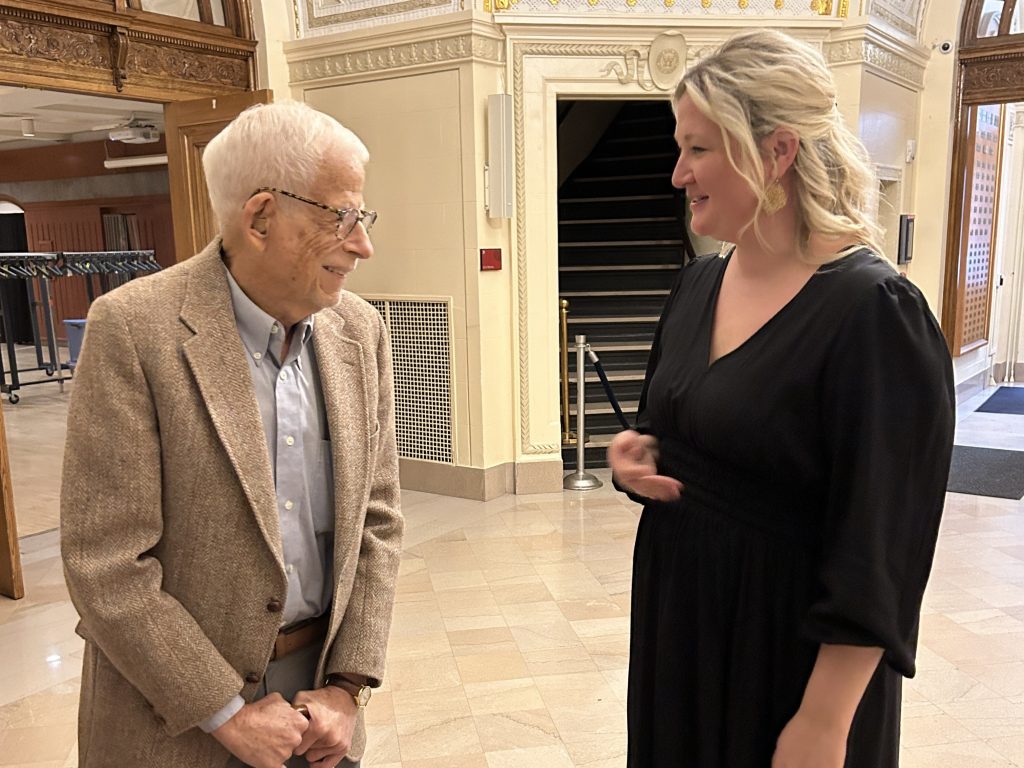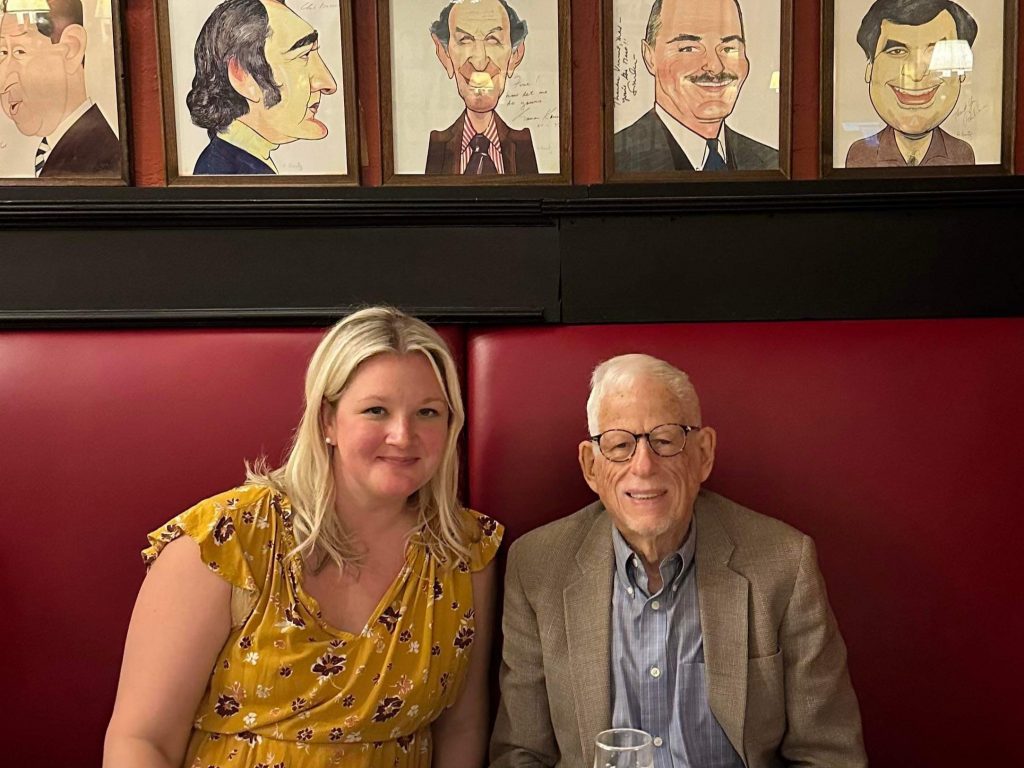Bridging Generations: A Conversation Between Dr. Allison Tyndall and Jerry Kappes '52
Jerry Kappes ’52 taught English at Regis from 1957 to 1982, and at a Christmas gathering in December 2022, he found himself talking to English teacher Dr. Allison Tyndall. The two quickly found themselves deep in conversation about books, plays, and teaching, and in the year that followed, they struck up a friendship. Kappes has since visited Dr. Tyndall’s classes on a half-dozen occasions and has joined her on outings with her Theater in New York class — a senior elective he helped create in the 1970s.
“I think it's safe to say we're in sympathy on a lot of impressions about what to teach and how to teach it,” said Dr. Tyndall, the English Department Chair who joined the Regis faculty in 2018. “I count it a singular privilege that I've been able to have a friendship with Jerry.” The two sat down to discuss how English classes have changed at Regis over the years — and how they haven’t.
Dr. Allison Tyndall: What keeps you coming back to visit classes?
Jerry Kappes ’52: Nostalgia, curiosity. You become attached to a place, and so you want to find out what's going on and how it’s doing.
AT: From my point of view, I see your investment in the institution as well. You want to see what's going on, but I think you really care about the English Department and how the school is continuing to live its mission.
JK: Yes. If you're a Regis graduate, there’s a connection that stays with you.
AT: What have you learned from your visits to my classes?
JK: Well, I learned that Gatsby is alive and well, just as I had thought the novel should be when I was on faculty. I was probably the first English teacher to bring Gatsby into the English curriculum.
AT: There were moments when you were able to pipe up in my class and share the reception history of Gatsby. It was kind of a largely overlooked text that picked up in popularity later on.
JK: By 1951, The Great Gatsby had become popular and was widely available in paperback. I wanted to take advantage of that availability and end the use of the tedious anthology textbooks, which I had endured as a student. And one of the great things that happened that coincided with the time I started teaching in 1957 was Sputnik and a spotlight on education.
AT: So we could compete with Russia.
JK: Yes, that was the thing. The U.S. was way behind, really in science and math, but it also involved teaching English and the advent of Advanced Placement. So I was able to get us away from textbooks and into a situation in which a teacher could devise his own course.
AT: Have you sat in on any specific classes that you’ve particularly enjoyed?
JK: Well, Gatsby, and also Waiting for Godot, which was the initial thing between us, when you told me you were teaching it. I had done a production of the play here on kind of a dare. I had boys reading it, and they said, “This is impossible. You can't put this on.” I said, “Well, let's try.” And it was fairly successful. That’s why I was very sorry to miss the production you went to with your students.
AT: I don't know if you'd agree with me, but I'd say this is a piece of philosophy. It works to disrupt a tradition in theater, but its content — I love teaching it with the juniors, because they're taking ethics in theology. They're reading Continental and modern philosophy. They're raising and trying to answer questions of existence, and they're seeing it in my class in a version of art. I was the only one teaching Godot, and to hear that you taught it 40-plus, gosh, almost 50 years ago now, was a touchstone that was really important to me. And then when you said you produced it — I was also involved with Regis Rep, and theater is a particular interest of mine. It was like, how did I not know this? I went right to the yearbook and dug up 1975. I found the photos of it, and I ran off copies for my kids. It's anecdotal, but that stuff is valuable to me.
JK: I should say also it was just one performance.
AT: One night only.
JK: Because it really wasn't on the schedule. Back at that time, we had a Jesuit, Denis Moran, SJ, who was a theater person, and he directed a lot of plays in the period.
AT: He's who you started Theater in New York with, right?
JK: Yes. And I said to Dennis, “Oh, I'd like to do this.” And whatever the play was for the fall production was already scheduled. So he said, “Well, let's try to fit it in.” And so it was just the one performance. But it seemed to work pretty well, thanks to great performances from Jose Forero, Joe Santi, Tom Weiser, and Chris Zarbetski.
AT: What inspired you to start Theater in New York?
JK: When senior electives started, it was something that would get the kids out of the classroom and could be very appealing as a senior elective. One of the things I always tried to do, just generally even before senior electives, is get the boys out into the city to experience the city, I guess in a way that I did not as a student. When I was a student, I never went to the theater. I knew there was Broadway theater, but to me, that was a grown-up thing. As a student here, I never went to the Met Museum. I think I must've known that it was there, but no teacher that I can recall ever gave any advice or assignment that would involve going over there. So I told the students a few times, “Go over to the museum, find a painting that you like, write about it, and let's see what you have.”
AT: Having seen it from different angles, what do you think makes a Regis English class a Regis English class?
JK: I would say what struck me coming back was the eagerness of the boys to say what they wanted to say. I had a note from one of my classmates who was remembering a particular teacher, Richard Horchler. He said something like, “With Horchler, it was so great because you knew that it was okay to say whatever was on your mind.” And I think that's the case with what I observed from sitting in your class.
AT: I see it the same way. The majority of my students that I teach are usually juniors, so I write a lot of college recommendations. And in preparation for me writing those letters, I have them fill out a reflection on the year. And I would say the number one top topic of reflection is about taking risks in class discussion. Whether it's a kid who's not afraid to speak, but is trying to curate what he says, letting go a little bit and taking a risk with an interpretation. Or a kid who speaks less, and I won't leave him alone, and over time he finds his bearings a little bit and is able to contribute something. I think that's the most-cited evolution, maybe hand in hand with writing an argument that they voice.
JK: That's what I think is special about the Regis English class. In the classrooms I've visited, I sense the same eagerness to speak up and voice an opinion. It’s still very much there, and that's what you want in an English class. You don't want to be standing there lecturing.
AT: I tell them, this is like a laboratory for thinking. You're going to conduct experiments, and they're not always going to work. You're going to work from the materials that you know, and the idea that you think is going to work, but you don't know it until you try it. If it fails, we leave it on the classroom floor. It doesn't matter. You haven't even committed it to writing. This is the place to test something, judgment free, and see if it has legs. That's a strength of this school, this curriculum. We’re not teaching to achieve a Regents score or an AP score. Genuine inquiry and production of thought are still alive here. And I mean, we've got to protect it.
Read more Regis news

